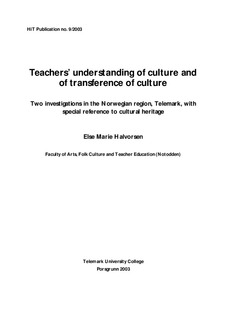Teachers' understanding of culture and transference of culture : two investigations in the Norwegian region, Telemark, with special reference to cultural heritage
Research report
Published version
Permanent lenke
http://hdl.handle.net/11250/2439186Utgivelsesdato
2003Metadata
Vis full innførselSamlinger
- HiT skrift [62]
Sammendrag
The two investigations concerning teachers’ understanding of culture deal with teachers’ concepts of culture and their experiences of transferring culture. The results indicate that there seems to exist a relationship between the teachers’ understanding of culture and their practice in school. The investigations have been carried out during a space of 10 years, in a region of Norway called Telemark. The first one started in 1990 and included a purposeful sample of 34 teachers related to aesthetic subjects. Each of them was interviewed for two hours during their school time. The interview guide from this investigation as well as its results represent the basis of the next investigation ten years later. But the project anno 2000 is related to a more representative sample of 300 teachers chosen by chance, engaged in all school subjects. This time the teacher group got a questionnaire of 7 pages, constructed around the same questions as the interview, but formulated more specifically. Unfortunately only 60% of them returned their responses. As both sample and methods are different in the two contexts, it is two different projects concerning the same problems over time, that will be discussed. In spite of these differences, the results have something in common. Primarily the terms culture and cultural heritage seem to be concentrated to humanistic areas and not to all school subjects.. Secondly each teacher group seems to have the same concept of culture both in relation to life world experiences, experiences of school teaching and as general concepts. Thirdly the results confirm a lack of correspondence between the content of the curriculum and the teachers’ views and practice, especially in the last investigation. The most explicit difference is between a normative concept of culture hold by teachers in the first investigation and a more descriptive one in the last one.
Utgiver
Høgskolen i TelemarkSerie
HiT skriftOpphavsrett
© The Authors/Telemark University CollegeBeslektede innførsler
Viser innførsler beslektet ved tittel, forfatter og emneord.
-
World culture, world history, and the roles of a museum: a conceptual study of the Swedish museums of world culture, debates concerning them, and their roles in cultural politics
Harding, Tobias (Peer reviewed; Journal article, 2020)The Museum of World Culture opened in 2004, partially in response to the increased immigration of the 1990s. This article analyses the political process leading to the establishment of the museum, and of the government ... -
Mapping the gap. What do we know about youth, cultural provision and cultural participation in Drammen? A pre-project
Hylland, Ole Marius; Kleppe, Bård (Working paper, 2012-10-03)Dette notatet presenterer resultatet av et forprosjekt med tittelen Mapping the Gap. Dette prosjektet har blitt gjennomført i et samarbeid mellom Drammen kommune, det engelske selskapet Creativity, Culture and Education ... -
UNESCO Cultural Policies 1966–1972 – the Founding Years of ‘New Cultural Policy’
Vestheim, Geir (Peer reviewed; Journal article, 2019)This article is a study of UNESCO cultural policies in the period 1966-1972. That period was the founding years of what was later called ‘new cultural policies’. In 1966 UNESCO adopted a declaration of international cultural ...
